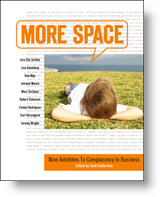Is Work Broken?


The global economy is an economy driven by brains rather than brawn. Knowledge and innovation are increasingly important to organizational growth and survival. In this course we will look at how accelerating technological advances, global integration, and rapidly changing demographic trends are altering the way organizations attract, build, and retain a competitive workforce. Designed for managers, human resource professionals, and trainers, this course explores emerging trends in the workforce and the workplace and examines strategies for managing these changes. Through readings, case studies, and a variety of outside experts, we will investigate the plans and practices of organizations in today’s dynamic business environment.
Fascinating stuff. I'm delighted Bob has asked me to work with his students even though it took a bit of fancy footwork explaining to my lovely wife what I'd be doing this Valentine's Day ;^)
Bob invited me, in large part, to discuss the impact, present and future, of technology on personal and group productivity. It's a topic I addressed in the essay Work is Broken that I contributed to the More Space project last fall. This project, conceived by Todd Sattersten of 800-CEO-Read, brought together nine business bloggers to riff on whatever topic they are most passionate about. The subtitle of the book that resulted from this collaborative effort is "Nine Antidotes To Complacency in Business".
The More Space contributors include:
- Jory Des Jardins from Pause
- Lisa Haneberg from Management Craft
- Rob May from Businesspundit
- Johnnie Moore from johnniemoore.com
- Robert Paterson from PEI's Future
- Evelyn Rodriguez from Crossroad Dispatches
- Curt Rosengren from Occupational Adventure
- Jeremy Wright from Ensight.org
Here is the summary of my essay on the project website:
Meetings, presentations, and e-mail are a part of many people’s work day. Used effectively, each can help keep teams aligned, impart important information, and move projects forward. We now are bombarded with information from the web, blogs, wikis, intranets, search engines, and other digital sources in addition to paper. We’re challenged to develop and maintain a system for collecting, processing, and acting on all of this information. And the classic techniques we’ve relied on in the past have either ceased to be effective or have simply broken. In this essay, I’ll share some proven techniques for fixing what’s been broken.
You can read my essay online, download a PDF, or listen to an audio version in a series of MP3 files (a bookcast?). Of course we'd all be delighted if you find the ideas we talk about compelling enough to earn a coveted spot on your bookshelf. The breadth of topics and depth of insight in my fellow contributors' work is profound and it has been a great joy to share space with them.
I'm looking forward to sharing some of the ideas, techniques, and practices we've developed and implemented at my company to foster better communication and productivity with Bob's class tonight. It should be an engaging and brain-bending conversation for everyone involved.